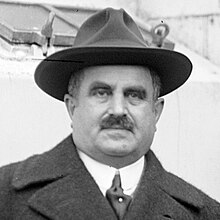Paul Davidson (producer)
| Paul Davidson | |
|---|---|

Paul Davidson
|
|
| Born |
30 March 1867 Lötzen, East Prussia (modern Giżycko, Poland) |
| Died | 18 July 1927 (aged 60) Ebenhausen, Weimar Germany |
| Nationality | German |
| Occupation | film producer |
Paul Davidson (30 March 1867 – 18 July 1927) was a German film producer.
Paul Davidson was born in Lötzen, East Prussia (modern Giżycko, Poland) the son of Moritz Davidson. He initially worked as a commercial traveller in the textile industry and became the manager of a security firm in Frankfurt am Main in 1902. On vacation to Paris he saw his first movie, a Georges Méliès film, in a cinema. Back in Frankfurt he founded the "Allgemeine Kinematographen-Theater Gesellschaft, Union-Theater für lebende und Tonbilder GmbH" (A.K.T.G.) on 21 March 1906 and opened Mannheim’s first permanent cinema, the Union-Theater (U.T.). Further cinemas followed in Frankfurt, Düsseldorf, Cologne, Strasbourg, Amsterdam and Brussels.
On 4 September 1909 Davidson opened the Union-Theater at Berlin, Alexanderplatz. Another Union-Theater was opened at Berlin's Unter den Linden on 21 August 1910, by 1910 Davidson had built up a "sizeable chain of 600–1000 seater luxury cinemas". On 2 August 1913 the Union-Palast, Kurfürstendamm, one of the first buildings of Berlin exclusively built as a movie theater, premiered with Max Reinhardt’s "Die Insel der Seligen". In March 1910 Davidson founded the Projektions-Aktiengesellschaft Union (PAGU), Germany’s first joint-stock company in film industry and the first to integrate production, distribution and equipment hire.
Following the success of Asta Nielsen’s The Abyss he founded the Internationale Film-Vertriebs-Gesellschaft in conjunction with Nielsen and her husband Urban Gad on 1 June 1911. The company held the European rights on all Nielsen films and Nielsen became a “scintillating international film star” with an annual fee of 85,000 Marks in 1914 alone.
...
Wikipedia
